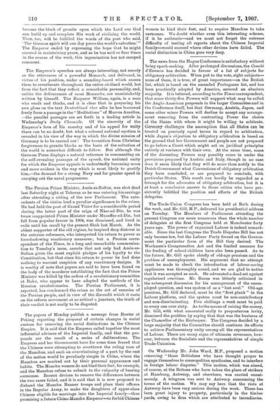The Trade-Union Congress has been held at Bath during the
week, and Mr. Gill, M.P., delivered his presidential address on Tuesday. The Members of Parliament attending the present Congress 'are more numerous than the whole number of delegates at the first Congress held at Manchester forty years ago. The power of organised Labour is indeed remark- able. Since the last Congress the Trade Disputes Bill has not only become law, but the Labour Party forced on the Govern- ment the particular form of the Bill they desired. The: Workmen's Compensation Act and the limited measure for the feeding of school-children have also been passed. As to the future, Mr. Gill spoke chiefly of old-age pensions and the problem of unemployment. His argument that no attempt must be made to check the introduction of labour-saving appliances was thoroughly sound, and we are glad to notice that it was accepted as such. He advocated a dead-set against regularised overtime. Mr. Burns was bitterly criticised in the subsequent discussion for his management of the unem- ployed question, and was spoken of as a "lost soul." Old-age pensions, Mr. Gill declared, must be the "first plank" in the Labour platform, and the system must be non-contributory and non-discriminating. Five shillings a week must be paid to every one over sixty. As to the means of raising the money, Mr. Gill, with what amounted really to preposterous levity, dismissed the problem by saying that that was the business of the Chancellor of the Exchequer. The Congress decided by a large majority that the Committee should continue its efforts' to achieve Parliamentary unity among all the representatives of Labour. There are many signs of ultimate severance, how- ever, between the Socialists and the representatives of simple Trade-Unionism.






































 Previous page
Previous page